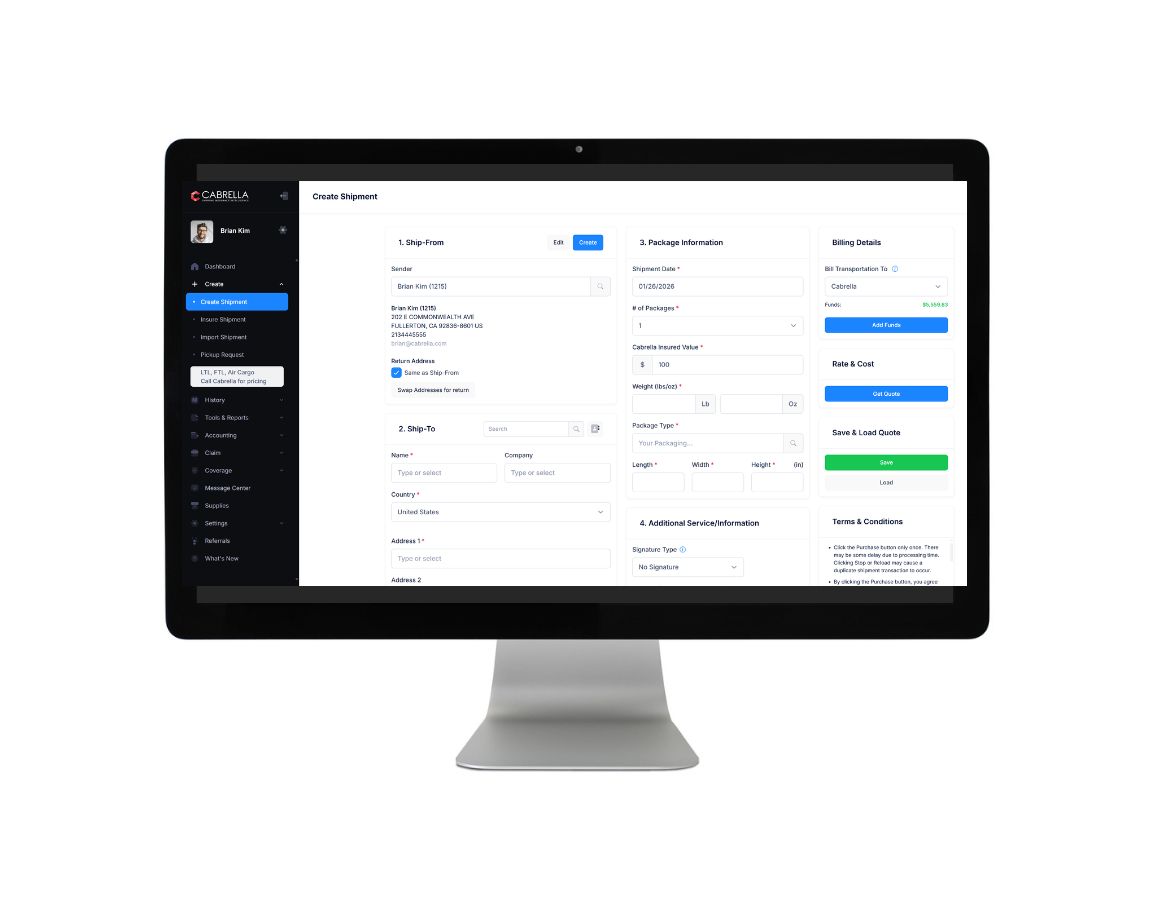Decoding International Shipping Policies: A Comprehensive Guide

In an interconnected global marketplace, international shipping is the foundation of modern commerce. From small businesses to multinational corporations, the seamless movement of goods across borders allows them to reach customers worldwide.
Understanding the nuances of international shipping policies, regulations, and processes is essential for businesses aiming to establish a strong presence on the global stage. Cabrella has your guide to the ins and outs of international shipping, providing clarity on how to master this important aspect of modern trade.
By partnering with Cabrella, businesses can streamline their shipping processes and minimize risks. Leveraging Cabrella's shipping insurance solutions, businesses can access cost-effective insurance options, real-time tracking, and dedicated support to ensure secure and efficient transport across borders.
What To Know About International Shipping
At the core of international trade lies the role of the shipper — the orchestrator of the entire shipping process. Shippers play a vital function in coordinating the movement of goods from the point of origin to the destination country, ensuring that shipments reach their intended recipients in a timely and cost-effective manner.
From small businesses shipping niche products to large corporations managing high-volume international shipments, understanding the nuances of international shipping is paramount for optimizing supply chain efficiency and managing logistical hurdles. Freight forwarders are also key facilitators, streamlining the transportation of goods across borders.
These logistics experts possess in-depth knowledge of customs procedures, shipping regulations, and trade agreements, enabling businesses to overcome the complexities of global trade.
What Is Involved in the Shipping Process?
Participating in the shipping process for international trade involves a multifaceted approach that necessitates adherence to existing procedures. Customs clearance is a critical juncture in the international shipping journey, requiring businesses to comply with various customs regulations, tariffs, and documentation requirements.
Failure to adhere to these regulations can result in delays, fines, or even the seizure of goods at the border, underscoring the importance of meticulous attention to detail. When venturing into international trade, businesses must familiarize themselves with export regulations, including the need for export licenses in certain industries.
Proper documentation, such as commercial invoices, bills of lading, packing lists, and customs forms, forms the bedrock of successful international shipments. It ensures smooth transit through customs checkpoints.
Additionally, the classification of goods using HS codes and adherence to Incoterms clarify buyers' and sellers' roles and responsibilities in the international shipping process. By studying the details of shipping processes and regulations, businesses can confidently participate in international trade.
What Are the Key Documents in International Shipping?
Proper labeling and documentation are the backbone of successful international shipping operations, ensuring efficient customs clearance and international shipping regulations. Commercial invoices are pivotal in detailing the specifics of each shipment, including the description of goods, value, and destination.
These invoices provide customs authorities with essential information to assess duties and taxes, facilitating the smooth transition of goods across borders. Along with commercial invoices, bills of lading serve as legal documents that outline the terms of a shipment, acting as a receipt of goods from the shipper to the carrier.
These documents facilitate the transfer of ownership and are necessary for tracking shipments throughout the shipping process. Additionally, packing lists offer detailed itemization of each package's contents, aiding customs officials in verifying their accuracy.
Understanding Incoterms — international commercial terms that define the responsibilities of buyers and sellers — is also helpful for establishing clear guidelines on the division of costs and risks. Furthermore, classifying goods using Harmonized System (HS) codes ensures uniformity in customs declarations and tariff assessments across countries.
What To Know About Regulations
Customs procedures vary from country to country, so it’s important to have a thorough understanding of the specific requirements and documentation needed for each shipment.
Tariffs imposed by customs authorities can significantly impact the cost of international trade and must be factored into pricing strategies. In certain instances, businesses may require an export license to ensure adherence to trade agreements and export regulations, especially when dealing with restricted or controlled goods.
Verifying the country of origin and the appropriate certificate of origin are also essential for following international trade laws. If you’re sending hazardous materials and dangerous goods, you need to fully understand the shipping process for those industries, which often require special handling and measures.
Staying on track with international shipping regulations involves engaging customs brokers with expertise in customs procedures and ensuring seamless customs clearance for shipments. By forming strategic partnerships with trusted customs brokers, businesses can streamline their international efforts.
What Shipment Considerations Should You Account For?
Considerations such as licensing requirements for shipping hazardous materials and adherence to export control regulations are vital for businesses in international trade.
Proper shipment documentation, including accurate labeling, packaging, and completion of required forms, is a must to avoid delays.
Businesses exporting goods to foreign countries like China must stay abreast of country-specific regulations, including shipping restrictions on products or materials. Pro forma invoices, which outline the terms of sale and provide important shipment details, are often required for international transactions and can facilitate customs clearance processes.
It is imperative for businesses to stay vigilant about shipping laws, licensing requirements, and trade agreements. Businesses can elevate their global competitiveness by proactively addressing shipment considerations.
What Are International Shipping Providers and Resources?
International shipping is a layered process that often requires the expertise and support of specialized providers and resources to succeed. Leading providers like Cabrella can facilitate international shipments, offer comprehensive logistics solutions, and ensure the seamless transportation of goods.
By leveraging the shipping services of international providers, businesses can benefit from efficient transit times, real-time tracking capabilities, and access to a global network of carriers like FedEx, UPS, DHL, and USPS. Freight forwarders, with their deep understanding of customs procedures and regulations, can also help businesses optimize their supply chain.
Engaging customs brokers is the final resource for businesses learning about international shipping regulations. Customs brokers bring valuable expertise in customs procedures, facilitate smooth customs clearance, and guide businesses through the details of import and export documentation.
What Are the Best Practices for Small Businesses?
Small businesses should proactively educate themselves on export regulations, including licensing requirements or restrictions on specific goods.
Maintaining accurate and up-to-date shipping documentation, such as commercial invoices, bills of lading, and packing lists, can keep you on track with international shipping laws and facilitate smooth customs clearance processes.
Small businesses should also do their due diligence on country-specific regulations, export controls, and trade agreements.
The Wrap-Up on International Shipping
When it comes to international shipping, adherence to regulations, meticulous attention to detail, and access to reliable resources are absolutely necessary.
As businesses expand their reach to foreign markets, understanding the details of international shipping policies can make sure your goods move seamlessly through the supply chain.
Partnering with trusted international providers and leveraging valuable resources also helps businesses come out on top with international trade. Collaborating with freight forwarders, customs brokers, and leading shipping providers like Cabrella can empower your company to optimize its supply chain and enhance its global competitiveness.
Decoding international shipping policies and practices is a prerequisite for businesses looking to establish a strong presence on the global stage. By leveraging key resources and fostering strategic partnerships like Cabrella, businesses can unlock new opportunities, expand their reach beyond borders, and embark on a successful trade journey.
Sources:
Customs Procedures for import and export - European Commission
Know Your Incoterms | International Trade Organization
How to get an export license or permit | USA.gov
Partnerships in eCommerce: How to be a great partner | LinkedIn
Keep Checking Out Our Other Posts
Subscribe for Email Updates









